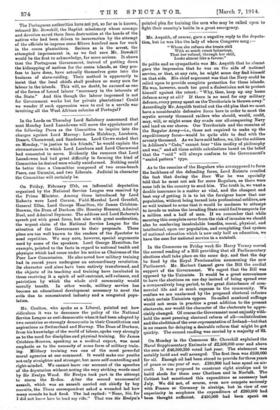Mr. Asquith, of course, gave a negative reply to the
deputa- tion, but be was like the lady of whom Congreve sang:— "Whom she refuses she treats still
With so much sweet behaviour, That her refusal, through her skill,
Looks almost like a favour."
So polite and so sympathetic was Mr. Asquith that he almost gave the impression that be was on the side of national service, or that, at any rate, he might some day find himself on that side. His chief argument was that the Navy could be relied upon to provide complete protection for these islands. He was, however, much too good a dialectician not to protect himself against the retort: " Why, then, keep up any home defence army at all P If there is no need for any military defence, every penny spent on the Territorials is thrown away." Accordingly Mr. Asquith trotted out the old plea that we must have a considerable defensive force here in order to meet the mystic seventy thousand raiders who should, would, could, may, will, or might some day evade our all-conquering Navy and land on our shores. Our Territorials and the remains of the Regular Army—i.e., those not required to make up the expeditionary force—would be quite able to deal with the seventy thousand. As we have said before, we, like the soldiers in Addison's "Cato," cannot bear "this medley of philosophy and war," and all these subtle calculations based on the belief that the " raid " will always conform to the Government's
"sealed pattern" type.














































 Previous page
Previous page